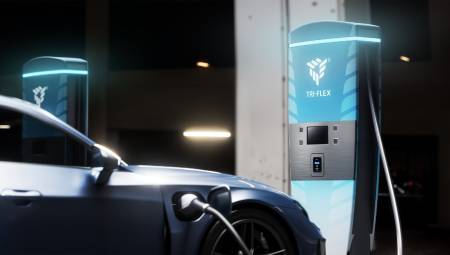Latin America. The global shortage of microchips severely impacts the automotive market and there is no quick resolution in sight. This supply chain disruption catches the attention of industry leaders and experts around the world, but the problem remains.
In short, there aren't enough chips to meet the demand. Some short-term tactics can help decrease losses, but long-term changes in supply chain strategy and planning are known to be required. Fortunately, with advanced technology, the impact of supply chain disruptions can be significantly mitigated in the future.
How does the current chip shortage affect?
Cars have literally become smartphones on wheels, and semiconductors have become increasingly critical to a number of applications, from fuel pressure sensors, digital speedometers, ai-powered tools that help in parking, finding the nearest gas station or alerting you that an oil change is needed. Without these tiny devices, the auto industry's post-pandemic recovery is delayed, and companies are unable to fulfill orders. According to some estimates, the impact on global production volumes will be approximately 7 to 8 million units, and McKinsey reports that major vehicle products have announced considerable declines in their production due to chip shortages, lowering the expected turnover by several billion dollars by 2021.
What happened to all the chips?
The problem began in the early months of the COVID-19 pandemic, when car sales fell nearly 80% in Europe, 70% in China, and nearly 50% in the United States. This was also reflected in Latin America. Lack of demand for new cars caused factories to close, workers went home, and orders for parts and components such as semiconductors were canceled.
This was not seeing in the long run. Tech Republic reports that when automotive OEMs closed and orders were canceled, they left chip suppliers with excess capacity in inventory. At the same time, some sectors needed more semiconductors to meet the demands of consumers at home and remote workers. Growing sales on PCs, tablets and electronics for students and workers who had to install work areas in their homes and people consumed more streaming. This helps to use the existing stock of chips. And this is still valid.
Who is affected by the chip shortage?
The impact is broad, going far beyond frustrated car buyers. When factories close, jobs are lost, impacting the economy. Industry Week reports the political ramifications: "The chip shortage that plagues manufacturing has a massive impact on the U.S. economy, decreasing car production and driving up prices." The White House has met with semiconductor executives and leaders in Europe trying to resolve the current chip issue and seek long-term solutions.
Changes are being made. The UK's Fleetnews reports "The sector is clearly navigating disruption. Car producers due to the shortage of chips are obliged to learn from the current situation to adapt and prepare for the future in a more efficient way."
Some OEMs are doing things on their own, trying to develop their own microprocessors and even their own software. This can mean greater control, many experts consider it economically impractical, since automotive chips are of low value, they are commodity items. Investing in developing them is a high-cost activity that would take years to become profitable.
One exception is Tesla, says Industry Week. It has designed a microchip for its "Full Self-Drive" system producing everything up to the chip itself. The investment can be profitable. In the second quarter, the automaker had a record number of vehicles reaching $1 billion in net profit for the first time.
The European Union wants to participate in the chip business
It was recently announced that the European Union intends to address this issue through legislation, hoping to create "technological sovereignty" in case there is a shortage in the future.
The EU wants to be the source of 20% of the world's semiconductor production by the end of the decade, according to the roadmap presented in March by the European Commission.
What can be done in the short term to solve the chip shortage?
Gartner suggests that automakers stay vigilant, continuing negotiations with chip vendors. "The current chip shortage is a dynamic situation, so it is essential to understand that it will change continuously. Performing the traceability of leading indicators such as capital investments, inventory rate and growth in the turnover of the semiconductor sector is an early indicator of the situation in inventory, which can help organizations to be alert on the issue and see how the growth of the industry in general continues. " says Gaurav Gupta, research vice president at Gartner.
How to respond to the long-term chip shortage?
Technology can help overcome complex challenges
Data Visibility. Manufacturing companies can find help in technology to leverage data and interpret economic indicators. Data analysis is an important weapon in this battle, but it must be applied strategically, projecting the likely results as well as the understanding of historical influences.
Extended supply chain visibility. The importance of supply chain visibility is clear. Such visibility must extend beyond top-tier suppliers, reaching the entire chain network. Although using secondary options, such as small cargo ships, adds some reliability concerns, complicating issues on another front. This should be a long-term effort with trial and error. Getting to the maximum detail is the only way to get a real view of potential risks and bottlenecks.
Maintaining supply chain flexibility and mitigating risk. It is not enough to simply observe the potential problems. Businesses should be able to act, reassign orders, or remapp transfer routes, as needed to keep inventory moving, routed to the most appropriate location. Platforms that link business partners, via common processes and shared data, can deliver optimized functionalities by significantly reducing risk.
Collaborative innovation. Changes to product design specifications can help facilitate some inventory gaps. Finding consumer chips with higher capacity (higher costs) can transform lower-priority automotive accounts into those that receive the most attention from semiconductor producers.
SEG Automotive uses technology to manage complexity
Innovative companies already use technology to improve operational objectives such as supply chain planning. The global automotive company SEG Automotive, for example, has an ERP solution in the cloud to face the challenges of the market. As a leading global supplier of components, SEG Automotive leads the trends. As cars have become increasingly technological, the company to keep pace provides sensors and AI technology and is recognized for being a technological pioneer. For this, it must have fluid processes that allow the innovative development of products.
"We can not only improve workflow management, but also use modern methods in digital manufacturing and machine learning," says Tim Zimmermann, ERP Director, SEG Automotive. "This allows us to take both production optimization and automated monitoring of our production to a new level."
SEG Automotive has launched several 4.0 technologies to optimize the use of data, connectivity and robotics. The solution enables the standardization of digital business processes, improves end-to-end visibility, and helps the organization apply integrated planning, AI-driven visibility, especially important during the semiconductor shortage.
The digital network with all the parts and the provision of centralized data achieves faster and more efficient decision making and easier reporting. A central view of enterprise data means industry 4.0 and machine learning are strategically implemented
SEG Automotive is an example of how technology helps overcome modern complexities. In the case of chip shortages, and other challenges, the company using a cloud solution will be better equipped to respond with agility and intelligence. Modern tools do not solve all challenges, but they are proven to better position companies to move forward.
Analysis written by José Rivero, Country Manager of Infor Mexico.













